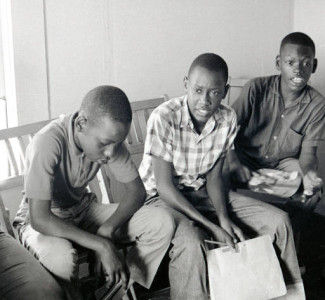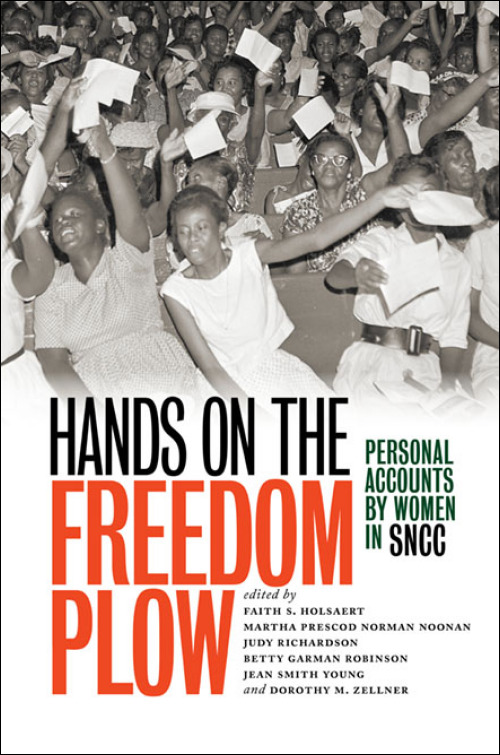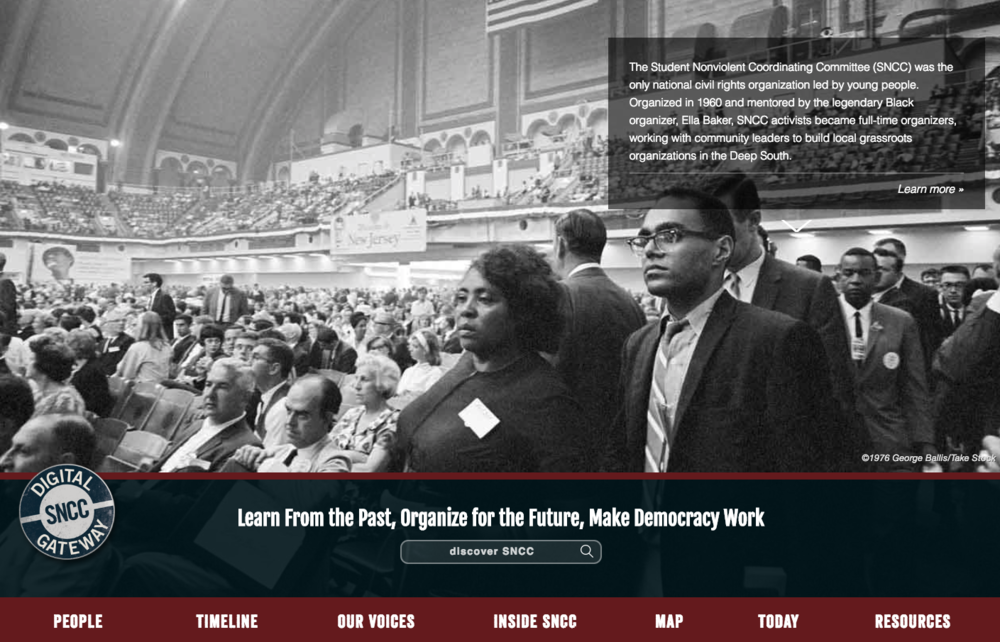Freedom Summer was organized by the Council of Federated Organizations (COFO), a coalition of the Mississippi branches of the four major civil rights organizations (SNCC, CORE, NAACP, and SCLC) to register African American voters and break through what Charles Cobb Jr. described as Mississippi’s “cotton curtain.” Visit the Civil Rights Movement Veterans website for a detailed timeline and related resources on Freedom Summer.
Below is the full text for the prospectus for Freedom Summer developed by COFO, followed by recommended resources for teaching and learning about Freedom Summer.
Prospectus for Freedom Summer
It has become evident to the civil rights groups involved in the struggle for freedom in Mississippi that political and social justice cannot be won without the massive aid of the country as a whole, backed by the power and authority of the federal government. Almost no hope exists that the political leaders of Mississippi will steer even a moderate course in the near future; in fact, the contrary seems true: as the winds of change grow stronger, the threatened political elite of Mississippi become more intransigent and fanatical in their support of the status quo. The closed society of Mississippi is, as Professor Silver asserts, without the moral resources to reform itself. And Negro efforts to win the right to vote cannot succeed against the extensive legal weapons and police powers of local and state officials without a nation-wide mobilization of support.
Therefore, a program is being planned for this summer which will involve the massive participation of Americans dedicated to the elimination of racial oppression. Scores of students, teachers, professors, ministers, technicians, artists, and legal advisers are now being recruited from all over the country to work in Mississippi this summer. Within the state intensive preparations have been underway since mid-January to develop structured programs which will put to creative use the talents and energies of the hundreds of expected summer volunteers. These programs can be divided generally into four main areas: freedom schools, community centers, voter registration and special projects.
Freedom Schools

A group of children from the Mobile Street area participating in a Freedom School class in Hattiesburg, Miss., during Freedom Summer, 1964. Second from the left is Charles Ray Leggett, and the other boys are Pete Jordan, Chip Benton, and a boy whose last name is Goudy. Source: © Herbert Randall Freedom Summer Photographs at USM
Plans are being made to set up as many Freedom Schools as can be realistically made to work. The number will ultimately vary according to the amount of housing that can be found in an area, the presence of facilities, and the recruitment of qualified staff personnel. Recent projections call for roughly ten day Freedom Schools and two or three away-from-home schools. The day Freedom Schools will for the most part draw 10th, 11th and 12th grade students from the locale. Each school will have a high student-teacher ratio, perhaps one teacher to every four students, so that instruction can be as individual as possible. It can be estimated that day Freedom Schools will have approximately fifty students and fifteen teachers each. Curriculum for these schools will cover a wide area: remedial work in reading, math, and basic grammar; seminars in political science and the humanities, journalism and creative writing; recreational programs such as dramatics, music appreciation, arts and crafts, organized athletics, movies; and voter registration field work. In addition, students will be encouraged to develop a school newspaper and organize a student government. Whenever possible, studies will be related to the society in which the students live. Away-from-home Freedom Schools will draw particular students from around the State. At present, two such schools are planned: one for high school drop-outs with a curriculum especially designed to prepare them for the State’s high school equivalency test, a second especially designed to prepare them for the State’s high school equivalency test, a second school for advanced high school students, possibly college students also, wherein intensive political-socioeconomic courses would be made available to them.
The Freedom Schools stand as an integral part of COFO’s voter registration activities. They will provide politically emerging communities with new young leadership, and constitute a real attack on the presently stifling system of education existing in the State. By the end of the summer, the basis will have been laid for a cadre of student leadership around the State of Mississippi committed to critical thinking and social action.
Community Centers
The Community Centers program projects a network of community centers across the state. Conceived as a long-range institution, these centers will provide a structure for a sweeping range of recreational and educational programs. In doing this, they will not only serve basic needs of Negro communities now ignored by the state’s racist political structure, but will form a dynamic focus for the development of community organization. The educational features of the centers will include job training programs for the unskilled and unemployed, literacy and remedial programs for adults as well as young people, public health programs such as prenatal and infant care, basic nutrition, etc. to alleviate some of the serious health problems of Negro Mississippians (for instance, Negro infant mortality rates in some counties are so high as to invite comparison with “underdeveloped” nations), adult education workshops which would deal with family relations, federal service programs, home improvement and other information vital to the needs of Negro communities, and also extracurricular programs for grade school and high school students which would not only supplement educational deficiencies but would provide opportunity for critical thought and creative expression. Each center would have a well-rounded library — to which Negroes in many communities now have no access.
Through the community centers program is primarily educational, some of each center’s resources would be used to provide much needed recreational facilities for the Negro community. In most communities in Mississippi the only recreation outside of taverns is the movies, and for Negroes this means segregated movies. If there is a movie theater in the Negro community, it is old, run down, and shows mostly out-of-date, third-rate Hollywood films. The film program of the centers will not only provide a more agreeable atmosphere for movies, it will bring films of serious content which are almost never shown in Mississippi, where ideas are rigidly controlled. Other recreational offerings will be music appreciation classes, arts and crafts workshops, drama groups, discussion clubs on current events, literature and Negro achievement, etc., penpal clubs, organized sports (where equipment allows), and occasional special performances by outside entertainers, such as folk festivals, jazz concerts, etc. Organized story-telling for young children will be entertaining, and will introduce them to the resources of the center’s library and to reading for pleasure in general.
Voter Registration
Voter registration workers will be involved in a summer long drive to mobilize the Negro communities of Mississippi and to assist in developing local leadership and organization. They will be involved in an effort to encourage as many Negroes as possible to attempt to register on the county book and will assist in a campaign, launched in February, to register over 400,000 Negroes on Freedom registration books. The Freedom registration campaign will involve establishing local registrars in every precinct in Mississippi with registration books resembling as much as possible the official books of the state. The Freedom registration books will serve as the basis for challenging the official books of the state and the validity of “official” elections this fall. Finally, voter registration workers will assist in the summer campaigns of Freedom candidates who will be running for Congress.
The voter registration workers will be deployed around the state in a number of ways: 1) every rural county will have a four man team. Whenever possible, attempts will be made to find housing in the county, but if housing cannot be found, the four man team could work the county while based in a nearby urban area; 2) there will be large numbers of students working in each fair-sized city; 3) saturation areas: there will be two, or possibly three, cities where a massive number of students, roughly 100 will be concentrated. Three possible areas would be Jackson, Meridian, and Greenville); 4) mobile units of four men and a car would fill gaps in the state political program and would move into crisis areas if the need develops.
Special Projects
Research Project: A number of summer workers will devote themselves entirely to research on the economic and political life of Mississippi. Some of this work will be done from out of the state, but much will need resources which can only be found in Mississippi. In addition, a number of people will be asked to live in white communities to survey attitudes and record reactions to summer happenings.
1) Legal Project: A team of lawyers and at least 100 law students are expected to come to Mississippi to launch a massive legal offensive against the official tyranny of the state of Mississippi. Law students will be dispersed to projects around the state to serve as legal advisers to voter registration workers and to local people. Others will be concentrated in key areas where they will engage in legal research and begin to prepare suits against the state and local officials and to challenge every law that deprives Negroes of their freedom.
2) White Communities: Until now there has been no systematic attempt by people interested in the elimination of hate and bigotry to work within the white communities of the deep South. It is the intention of the Mississippi Summer Project to do just that. In the past year, a significant number of Southern white students have been drawn to the Movement. Using students from upper Southern states like Tennessee, and occasionally native Mississippians, SNCC hopes to develop programs within Mississippi’s white community. These programs will deal directly with the problems of the white people. While almost all Negroes in Mississippi are denied the right to vote, statistics clearly indicate that a majority of whites are excluded as well. In addition, poverty and illiteracy can be found in abundance among Mississippi whites. There is in fact a clear area for Southern white students to work in, for in many ways Mississippi has imprisoned her white people along with her blacks. This project will be pilot and experimental and the results are unpredictable. But the effort to organize and educate whites in the direction of democracy and decency can no longer be delayed.
3) The Theater Project: Sponsored by the Tougaloo Drama Department. This summer will also mark the beginning of a repertory theater in Jackson, Mississippi. The actors will be Negro Mississippians; the plays will dramatize the experience of the Negro in Mississippi and in America; the stage will be the churches, community centers and fields of rural Mississippi. Using the theater as an instrument of education as well as a source of entertainment a new area of protest will be opened.











What courageous history and a fabulous collection of eye opening resources which should provide the foundation and motivation for true freedom